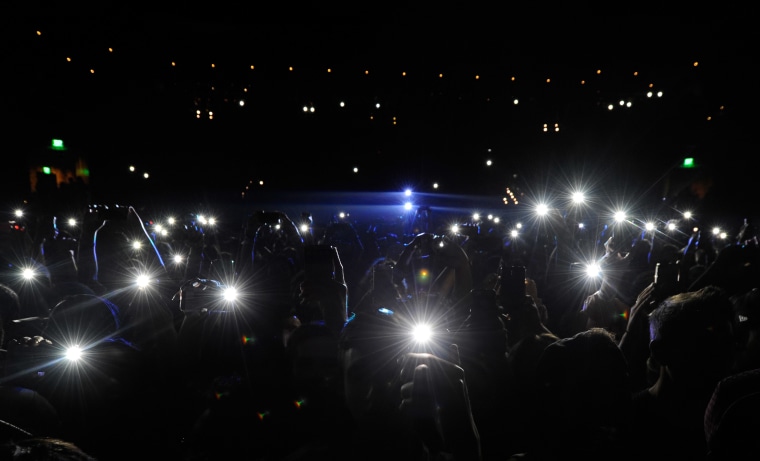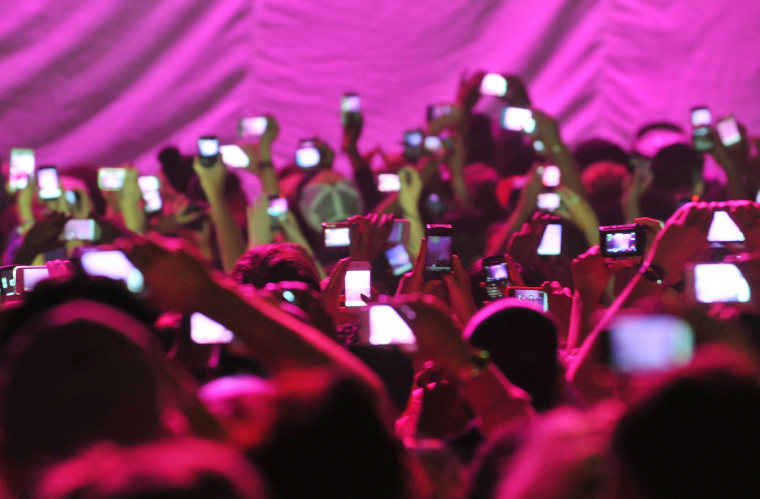The ubiquitous camera phone has some big name musicians telling their audiences to stop filming and photographing their shows, and a patent awarded to Apple this week might make no-photo zones a reality. But new research suggests the innovation could end up diminishing the very thing performers say they want to protect: fans' enjoyment of their shows.
Music superstars like Adele, Alicia Keys and Beyoncé are among those asking — or demanding — that fans put away their cell phones at their shows. While their stated reasons differ slightly, they essentially want fans to enjoy the concerts with their natural recording devices — eyes, ears and memories.
Adele, for example, recently halted a performance in Italy to ask a fan to pack up her video camera and tripod.
Keys and some other artists have turned to technology to enforce their will, using a device that locks up cell phones while concert-goers are in the venue.
They apparently found an ally in Apple, which was reported this week to have patented a new technology that would disable iPhone cameras from recording or photographing live shows through the use of infrared signals beamed from the stage.
Related: Apple Just Patented a Device to Stop You Recording Live Shows
The camera-phone push-back has itself sparked a backlash from some live music fans who argue that taking pictures at shows both enhances their enjoyment and ability to remember the experience.
Those fans are backed up by a limited but growing body of research.
A 2013 study in Psychological Science found that people who took photographs remembered fewer details about a trip to a museum than people who visited the museum sans cameras, but scientists say the conclusion of the study doesn’t mean memories are lost.
“A key point [of the study] is not so much that taking pictures decreases our memory but rather that it shifts our memory focus,” said Tracy Alloway, Ph.D., a psychologist who studies the effects of technology use on the brain.
“This process is known as transactive memory, which means that we rely on other sources — family, friends, iPhone, social media — to store our memory for us," Alloway told NBC News.
Another study published last month found that the mere act of taking pictures during an event leads to increased satisfaction during and after the experience — even if photo-takers aren’t given access to their pictures later — as long as the photo-taking doesn’t become an impediment to focusing on the event.
The study, published in the Journal of Personality and Social Psychology, found in several instances — during a bus tour, at a museum, during a meal and at a simulated concert — people who took photos ranked their level of enjoyment higher than people who simply observed.
“Being engaged means you pay more attention to the core aspects of the experience.”
The study found that people are, in fact, more engaged when they take photos and therefore, more satisfied, because increased engagement in an experience “has been shown to boost feelings of joy.”
“Being engaged means you pay more attention to the core aspects of the experience,” one of the study’s authors, Kristen Diehl, told NBC News. “When the experience is positive, those who are more engaged and immersed will enjoy an experience more.”
A telling portion of the study tracked people’s eye movements at the museum. People who were told not to take photos diverted their attention more often away from the artifacts. Those who were told to take photos spent more time observing pieces in the museum and ranked their enjoyment higher.
However, just as greater engagement increases enjoyment, distraction marked a decrease in enjoyment. And sometimes the process of taking a photo — like fiddling with a large camera and tripod, as was the case with Adele's Italian fan — becomes an impediment to fully taking in an experience.
Part of the enjoyment study asked subjects to perform an extra step before taking a photo of an pleasurable experience and then take time to delete photos after. The study showed that the distraction negated the positive effects of taking a photo on levels of enjoyment.
“Taking photos may shift one’s attention away from the rich emotional experience, reducing enjoyment. Similarly, it is possible that in social situations (e.g., dinner with a friend), photo taking is more disruptive (e.g., to the flow of conversation) and could reduce enjoyment of the experience,” it said.
“I don't like when they take videos of an entire song or throughout the show. That’s a waste of time.”
Many artists argue that the phones are distracting; not only for the person taking the photo, but also the dwindling contingent of fans who choose to keep their phones in their pockets during concerts.
“It is distracting,” said Christopher Watson, a Brooklyn-based musician, who has been performing live in New York for four years. “I don't like when they take videos of an entire song or throughout the show. That’s a waste of time,” said Watson, 26.

But he conceded that performers grow accustomed to distraction, and he reaps a benefit when fans take photos or videos and post them online. “In order to be successful these days, you need social media,” he said.
And when fans film “you gain content you couldn’t capture yourself,” he said. “That’s powerful.”
Jane Davidson, the founder of BEGIN, a brand development firm, agreed. “Having fans post on social media is a great way to get buzz going for bands. Most artists embrace having fan photos,” she said.
And for concert-goers, posting about a show they attended can enhance the experience even beyond the increased satisfaction that comes from simply snapping a photo.
“Sharing your experiences on social media is part of the joy of going to the live show in the first place” Davidson said.
Watson said that while the cameras are sometimes bothersome, fans should be allowed the liberty to decide how best to enjoy a musical performance.
“I would rather (fans) enjoy themselves, and if enjoying themselves means they take a photo, then so be it,” he said. “They’re saving a moment.”

